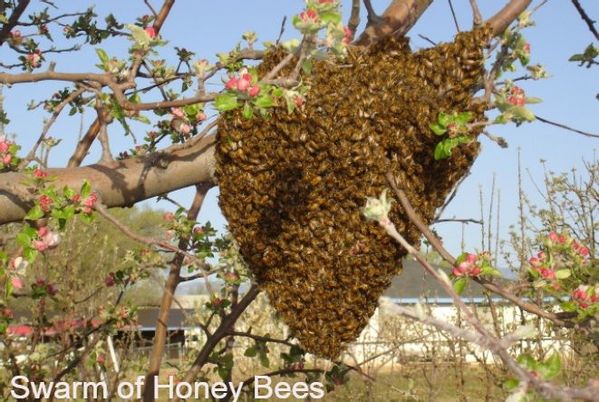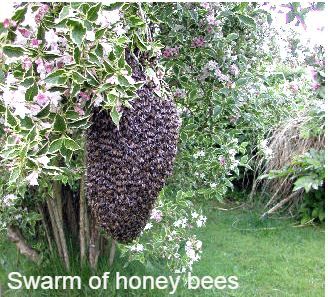Before you contact us with regards to bees in your garden please check the swarm photos and read the information on this page first. A beekeeper who collects swarms will need to speak to you and probably ask you for photos before agreeing to come out to you. This is because 9 out of 10 calls we receive are for bumble bees and we can only collect honey bees that that have gathered safely in a swarm.
For further information and support please visit www.bbka.org.uk/swarm

Do you have a Swarm of Honey Bees? (read below)
or
Bees in a bird box or under the roof tiles (click here)
During the summer months, especially in May and June, honey bees may leave their hive and form a swarm. This is part of their normal life cycle as they split their colony and set off to find a new location to set up an additional colony.
A swarm can be alarming, with a cloud of bees buzzing around making a loud sound that could be interpreted as anger. However, swarming bees are usually quite docile as long as they are not interfered with, being intent on finding a safe secure place where they and their leader, the queen, can set up home.
If this happens to be in your tree, on your fence or in part of your home, it can be a nuisance and most people would prefer they weren’t there!
If you have a swarm, and it can be reached safely, a local beekeeper may be able to help by collecting and removing the bees, usually taking them to a hive that is part of an apiary.
However, beekeepers can only deal with swarms of honey bees and cannot help with wasps, bumble bees or other types of insects.
To help you decide whether you need to contact a beekeeper, the British Beekeepers Association has an excellent website which will help you to identify the insects as honey bees. It also includes a link to find a local swarm collector in your area in case you need their help. www.bbka.org.uk/swarm
In our area for example, we have seven volunteer swarm collectors. Of these, five are seventy years of age or over.
We will still be able to give advice over the phone but most of us will not be able to collect swarms.
Bumble Bees that have made nests in your garden or bird box will move on around September time and even swarms of honey bees only find a temporary resting place until they eventually move on after a few days.
So please try and be patient with the bees, especially this year.
Remember, whilst they are with you they will be pollinating the plants in your garden and are unlikely to harm you unless you cross their flight path.

North Lincolnshire Beekeepers' District is committed to the encouragement, improvement, advancement and promotion of Beekeeping within the County.
They meet on the last Monday of each month at Broughton Village Hall at 7:30pm and enjoy a variety of speakers and activities linked to beekeeping and other subjects of environmental interest. Visitors are always welcome.
For more details of our meetings click here
They meet on the last Monday of each month at Broughton Village Hall at 7:30pm and enjoy a variety of speakers and activities linked to beekeeping and other subjects of environmental interest. Visitors are always welcome.
For more details of our meetings click here
